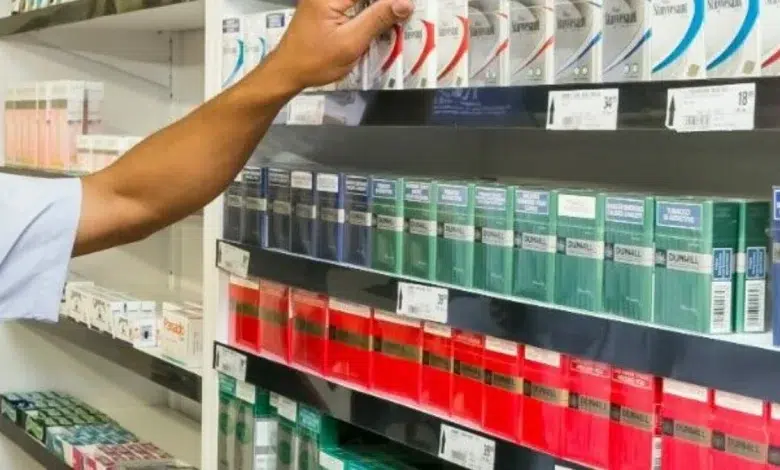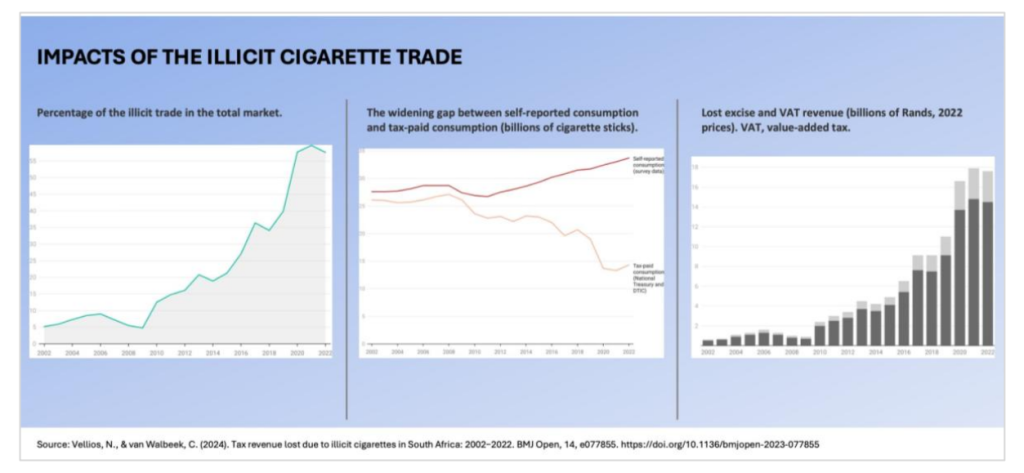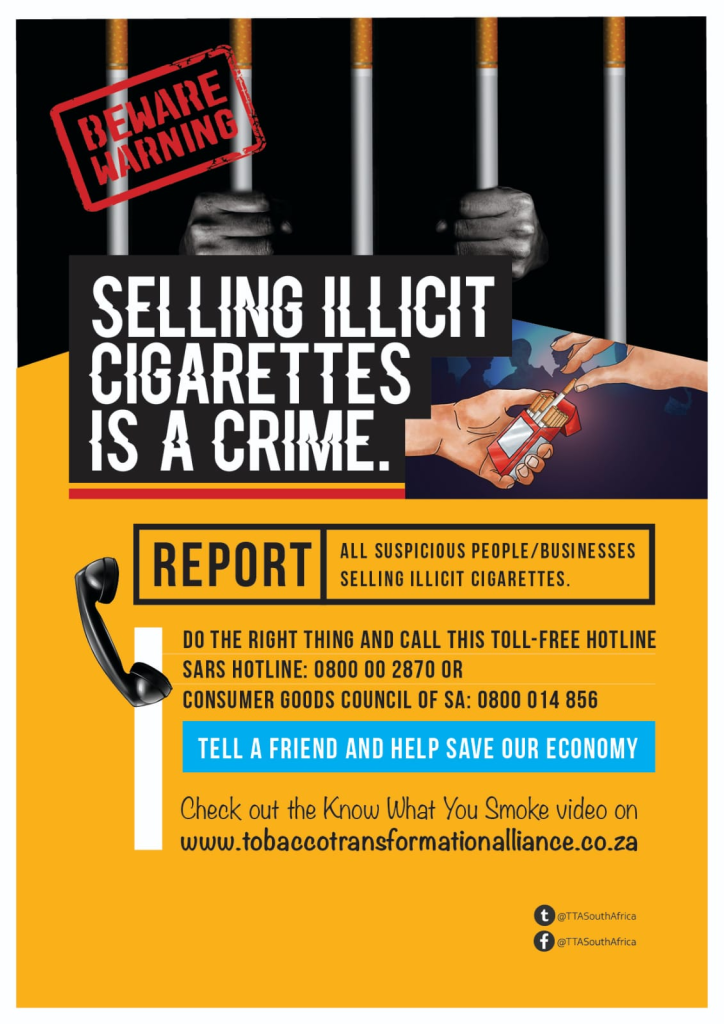How Illegal Cigarettes Are Squeezing Township Spaza Shops – And What Needs to Change

The illicit cigarette trade in South Africa has seen a dramatic rise in recent years. Illegal cigarettes now account for up to 60-70% of the total cigarette market. This booming black market has become deeply entrenched within township economies. It severely undermines legitimate businesses like township spaza shops, which rely heavily on tobacco sales for survival.
Table of contents
- The Scale of the Illicit Cigarette Market in South Africa
- Impact on Township Spaza Shops
- a. Price Undercutting
- b. Risk of Non-Compliance
- c. Economic Displacement
- d. Community Safety Concerns
- Factors Fueling the Growth of the Illicit Cigarette Market
- a. Weak and Fragmented Enforcement
- b. Impact of the COVID-19 Tobacco Ban
- c. Complex Supply Chains
- d. Regulatory and Policy Gaps
- What Needs to Change: Recommended Actions
- a. Strengthen Enforcement and Compliance
- b. Support Legal Spaza Shops
- c. Public Awareness Campaigns
- d. Update Regulatory Frameworks
- e. Collaboration Across Stakeholders
- f. Address Socioeconomic Drivers
- Stay Safe, Buy Legal
The Scale of the Illicit Cigarette Market in South Africa
Recent research and reports indicate that illegal cigarettes now account for more than half of all cigarettes consumed in South Africa. Some sources suggest that up to 75% of cigarettes sold in informal outlets, including spaza shops, are illicit. These illegal products are often sold at prices well below the legal market rate. They avoid taxes and regulatory fees, benefiting from criminal networks that evade the law.
The financial impact of the illicit trade is staggering. The South African government loses an estimated R7 billion annually in lost tax revenue due to the illegal cigarette market. This not only affects the economy but also exacerbates public health challenges. The availability of cheaper cigarettes increases smoking rates, which in turn puts additional strain on the country’s already burdened healthcare system.
Impact on Township Spaza Shops
Township spaza shops play a crucial role in their communities, providing access to essential goods, including cigarettes. However, the rise of illicit cigarettes is creating several challenges for these small, often family-run businesses:
a. Price Undercutting
Illicit cigarettes are often sold at a fraction of the price of their legal counterparts. Sometimes they sell as low as half the price of a legal pack. This undercutting creates intense pressure on legally compliant spaza shops. They must either lower their prices or risk losing customers. The inability to compete with illegal prices forces some shops to sell illicit cigarettes themselves, further perpetuating the cycle.
b. Risk of Non-Compliance
Spaza shops that sell illicit cigarettes risk severe legal consequences. These include fines, sanctions, and even business closure. However, the pressure to meet consumer demand and remain competitive has led many small business owners. They often take the risk of stocking illegal products.
c. Economic Displacement
Sales of legal tobacco products contribute significantly to the growth of small businesses and government tax revenue. The increasing prevalence of illegal cigarettes diverts money away from legitimate businesses. This deprives both business owners and the government of income. This disruption destabilizes township economies and hinders growth in the informal retail sector.

d. Community Safety Concerns
The illicit cigarette market is often controlled by criminal syndicates, which further exacerbates safety concerns in township areas. These syndicates contribute to a rise in local crime and violence, affecting the community’s overall security and stability.
Factors Fueling the Growth of the Illicit Cigarette Market
The growth of the illicit cigarette market can be attributed to several structural and enforcement challenges:
a. Weak and Fragmented Enforcement
In recent years, fragmented and weakened enforcement of laws targeting the illicit cigarette trade has hindered progress. Authorities have reduced or disbanded specialized enforcement units in the South African Revenue Service (SARS) and law enforcement agencies. This lack of oversight hampers efforts to disrupt the supply chains of illegal cigarettes.
b. Impact of the COVID-19 Tobacco Ban
The national tobacco sales ban during the COVID-19 pandemic unintentionally strengthened illicit networks. Legal suppliers were forced to halt operations. Hence, illegal suppliers capitalized on the market gap. They expanded their networks and diversifying distribution channels that remain difficult to control.
c. Complex Supply Chains
Illicit cigarettes are distributed through informal and unregulated channels, such as street vendors and unregistered spaza shops. Many of these products lack the necessary tax stamps and health warnings. This makes it difficult for authorities to identify and seize them. The complexity of the supply chain further hampers enforcement efforts.
d. Regulatory and Policy Gaps
Proposed changes to tobacco regulations could unintentionally fuel the illicit market. This could happen if they are not carefully crafted and implemented alongside stronger enforcement mechanisms. Gaps in the regulatory framework make it harder to close down illegal suppliers. It is challenging to maintain effective control over the market.
What Needs to Change: Recommended Actions
Protecting township spaza shops and curbing the growing illegal cigarette trade requires a multi-pronged approach. The following actions are essential:
a. Strengthen Enforcement and Compliance
Rebuilding and properly resourcing specialized units within SARS and law enforcement agencies is critical. These units must intensify raids and crackdowns on illegal cigarette manufacturers, distributors, and sellers. A particular focus should be on the criminal networks that profit from the trade.
b. Support Legal Spaza Shops
It is essential to provide education and regulatory support to help spaza shops transition to selling legal tobacco products. Offering financial incentives or compliance training can help reduce the risks of legal penalties. It can encourage business owners to choose legal products, ensuring sustainable livelihoods for shop owners and their families.
c. Public Awareness Campaigns
Public campaigns, such as the “Buy Legal, Stay Legal” initiative, are vital in educating consumers about the risks associated with illicit cigarettes. By raising awareness of legal cigarette pricing, tax stamps, and health warnings, these campaigns can encourage consumers. Persuasion can help them choose legal products and reduce demand for the illicit market.
d. Update Regulatory Frameworks
Policy reforms such as the Tobacco Products and Electronic Delivery Systems Control Bill must be carefully implemented. This is necessary to avoid inadvertently boosting the illegal market. Any new regulations must be coupled with robust enforcement to ensure that illegal traders cannot exploit regulatory loopholes.
e. Collaboration Across Stakeholders
Collaboration between government agencies, industry stakeholders, community leaders, and law enforcement is essential. This is necessary to address the supply chain issues that facilitate the illicit trade. By working together, stakeholders can identify weaknesses in the system. They can implement targeted interventions to curb the illegal cigarette market.
f. Address Socioeconomic Drivers
Broader interventions targeting poverty, unemployment, and crime are critical to reducing the appeal of illegal markets. By addressing the root causes that drive communities to rely on illicit trade, long-term solutions can be found.
Stay Safe, Buy Legal
The illegal cigarette trade poses a significant threat to the survival of township spaza shops in South Africa. By flooding the market with cheap, unregulated cigarettes, illicit trade undermines legal businesses. It jeopardizes the economy and increases safety risks in local communities.

A concerted effort to strengthen enforcement, support legal businesses, and address the root causes of the illicit trade is essential. This is crucial to reversing this trend. With strategic policy changes, public awareness, and targeted action, South Africa can protect the livelihoods of township spaza shops. Additionally, it can secure government revenue and promote healthier communities.



